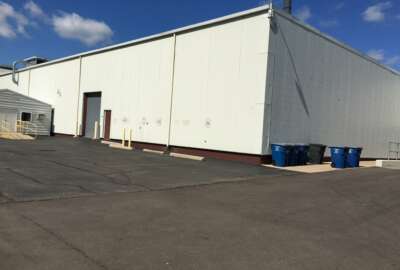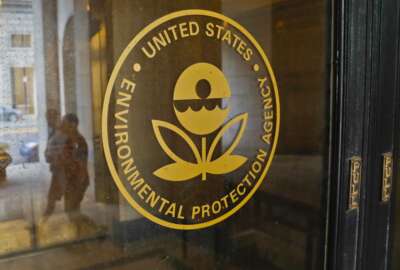
EPA delays plans to close Houston lab, relocate employees amid nationwide consolidation
The EPA told employees last week that it is pushing back plans to relocate Houston lab employees from their current leased office space to another facility about...
Best listening experience is on Chrome, Firefox or Safari. Subscribe to Federal Drive’s daily audio interviews on Apple Podcasts or PodcastOne.
The Environmental Protection Agency, having consolidated several of its facilities nationwide over the past few years, is delaying plans to close a lab in Houston.
The EPA told employees last week that it is pushing back plans to relocate Houston lab employees from their current leased office space to another facility about 400 miles away in Ada, Oklahoma.
The agency, at first, planned to relocate employees no later than 2023, but is now pushing those plans back to 2027. The relocation would affect about 30 EPA lab employees and 11 contractors.
“EPA has heard and takes seriously the concerns of its employees related to this relocation,” the agency said in a May 3 email to employees. “We hope this new timeline will provide the agency with the opportunity to continue to work with our impacted staff on a smooth transition while ensuring full transparency throughout the process.”
The American Federation of Government Employees has urged the Biden administration to cancel plans to close the Houston lab. The EPA under the Trump administration pursued plans to consolidate facilities.
AFGE Local 1003 President Justin Chen said management cited “significant changes within timelines and also costs” for modifications to the Oklahoma lab, in order to accommodate additional employees.
“As everyone knows, due to COVID-19 and the supply chain and logistical issues around the world, essentially everything is quite a bit more expensive, due to inflationary rises in price,” Chen said in an interview Friday.
E&E News reported in June 2019 that former EPA Region 6 Administrator David Gray briefed employees about relocating to the Robert S. Kerr Environmental Research Center in Ada, Oklahoma within the next three years.
Chen said “significant pushback” from both employees and Congress contributed to the EPA’s decision to postpone the lab’s closure.
The Houston lab processes environmental samples for EPA Region 6, which includes Arkansas, Louisiana, New Mexico, Oklahoma and the rest of Texas.
Chen said those samples come from Superfund sites, natural disasters and human-made disasters. The Houston processed samples from the 2010 Deepwater Horizon oil spill in the Gulf of Mexico.
That incident spilled 4 million barrels of oil into the gulf over 87 days. The EPA considers it the largest oil spill in the history of marine oil drilling operations.
Chen said the relocation would disrupt the lives of EPA employees who have set down roots in the area. The Houston lab, he added, serves a region that’s vulnerable to climate change and hurricanes. Hurricanes Harvey, Irma and Maria devastated the Gulf Coast in 2017.
“Houston is an incredibly important location to conduct such a mission. It’s in the petrochemical heart of the United States, arguably the petrochemical heart of the world essentially. It’s also an incredibly important area for environmental justice,” Chen said.
He said the Houston lab is also well positioned to gather samples from the Mississippi River in Baton Rouge, Louisiana. But the Mississippi Delta would be at least an eight-hour drive once lab employees are relocated to Oklahoma.
Chen said the rationale for the EPA lab closure dates back to the Obama administration executive order, which directed agencies to reduce leased office space across the federal government.
“The rationale was supposedly a cost-savings measure,” Chen said.
The EPA in its fiscal 2021 budget request expected to save $1.8 million annually in lease costs by moving out of the Houston lab and relocating staff to the agency-owned facility in Oklahoma.
The EPA in that same budget request also looked to consolidate office space in Washington, D.C and optimize office space at a lab in Athens, Georgia.
The D.C. consolidation was expected to begin in March 2021. It impacts employees who work for the agency’s Office of Research and Development, Office of Land and Emergency Management and Office of Chemical Safety and Pollution Prevention.
The EPA seeks to move 1,200 employees from its Potomac Yard One building in Arlington, Virginia to the agency’s headquarters at the William Jefferson Clinton Complex in Washington, D.C.
Chen said the EPA also recently closed a lab in Richmond, California and relocated those positions to Corvallis, Oregon. However, Chen said none of the lab employees in California took those relocation offers.
“Now the agency has to basically restock all of that Region 9 lab staff with new hires or transfers, basically, in Corvallis, Oregon,” Chen said.
The EPA also closed and consolidated several sites during the Trump administration.
The EPA’s Office of Research and Development, including its National Exposure Research Laboratory, ceased operations in Las Vegas in 2018, and gave the 50 employees impacted by the closure about six months to relocate to new offices, accept a buyout or step down from their positions.
The EPA in 2019 closed its Las Vegas Finance Center and move all grants-related functions to the Research Triangle Park Finance Center in North Carolina.
The agency in 2018 also closed the Large Lakes Research Station in Grosse Ile, Michigan and relocate personnel to the National Vehicle and Fuel Emissions Laboratory in Ann Arbor. That move affected about 20 EPA emergency response employees.
Copyright © 2025 Federal News Network. All rights reserved. This website is not intended for users located within the European Economic Area.
Jory Heckman is a reporter at Federal News Network covering U.S. Postal Service, IRS, big data and technology issues.
Follow @jheckmanWFED
Related Stories

EPA, DHS drop leased office space, consolidate workforce under Trump budget plan





